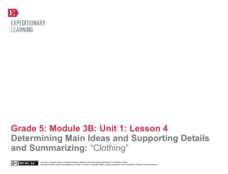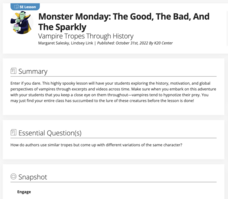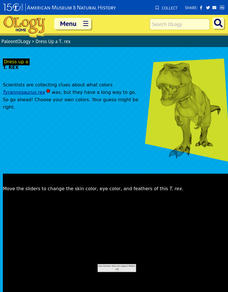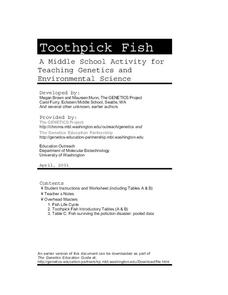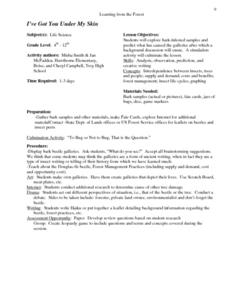State Bar of Texas
Grutter v. Bollinger
A university decides not to allow a qualified scholar to enter its institution based on skin and gender—but this case is about a white female? The 2003 Supreme Court case Grutter v. Bollinger lays the foundation for open discussion and...
Biology Junction
Plasma Membrane – Gateway to the Cell
Just as skin covers your body limiting what can go in and out, plasma membranes cover cells to do the same. Scholars begin with a presentation that gives overview of the structure and function of plasma membranes. Then, they learn how...
EngageNY
Determining Main Ideas and Supporting Details and Summarizing: “Clothing”
Surviving winter. Pupils begin reading on page 18 of The Inuit Thought of It: Amazing Arctic Inventions and sketch how the people used animal skin clothing to survive the winter. Readers complete a main idea graphic organizer...
K20 LEARN
Monster Monday - The Good, the Bad, and the Sparkly: Vampire Tropes through History
Fangs, capes, pale skin, and beady eyes! High schoolers investigate the tropes associated with vampires by examining excerpts from stories and films. They then create a timeline that reveals how the depictions of vampires have evolved...
University of Colorado
Patterns and Fingerprints
Human fingerprint patterns are the result of layers of skin growing at different paces, thus causing the layers to pull on each other forming ridges. Here, groups of learners see how patterns and fingerprints assist scientists in a...
Super Teacher Worksheets
Mammal Scavenger Hunt Activity
Did you know that a polar bear's skin is actually black? Or that the lightest mammal weighs less than a paperclip? Young scientists learn these and other amazing facts about mammals as they explore the animal kingdom with...
CK-12 Foundation
Hot Oven
Why does the air in a hot oven not burn skin, but metal in the oven does? The simulation focuses on the difference between temperature and thermal energy and the way these are transferred. Scholars adjust the temperature of an oven and...
Royal Society of Chemistry
Pollutants in Air (14-16)
Polluted air contains more than 200 chemicals that age the skin, causing urban women to appear 10 percent older than their rural peers. An interesting interactive connects air pollutants and related data. Scholars work their way through...
Reed Novel Studies
Wonder: Novel Study
Beauty is more than skin deep. Auggie, the main character in Wonder, has a facial defect, but his inner beauty shines. Taking a cue from Auggie, scholars learn how a person is more than outer appearance. To finish the resource, they...
Learning for Justice
Looking Closely at Ourselves
A thoughtful discussion about self-reflecting leads to a conversation about skin color and making a list of words associated with "beauty." Budding artists use a mirror to examine their features and create a self-portrait. Peers critique...
American Museum of Natural History
Dress up a T. Rex
Scholars play with an image's color and brightness to predict how tyrannosaurus rex's skin, feathers, and eyes would have appeared. Information and real-world pictures shed light on what evidence guides our assumption of how a...
Curated OER
Your Body's Defenses When Microbes Attack
Students study how being exposed to a harmful microbe doesn't automatically make them ill. They discover the lines of defense against microbe invaders and explore the roles of skin and mucus membranes, white blood cells, and lymphocytes...
University of Washington
Toothpick Fish
With colored toothpicks representing genes, youngsters practice passing them through generations of fish and learn about heredity. Consider this as an introductory activity since it does not represent recessive genes with lowercase...
Curated OER
My Monster
Explore descriptive language. Learners read a series of similes describing the eyes, teeth, skin, and other features of a monster. Then, they describe their own imaginary monster using similes and adjectives. Very creative!
Curated OER
UV Rays
Fourth graders study the effects of UV rays and practice finding the UV index for where they live. In this health lesson, 4th graders listen to a lecture about ultraviolet rays, then find the UV index in their area and write a story...
Curated OER
Scales, Scutes, and Skins
Students identify the various adaptations of reptiles and amphibians. After distinguishing between reptiles and amphibians, students discuss the ways in which their adaptations aid in their survival. They participate in a hands on...
Curated OER
Ft. Vancouver Fur Trade: a Skin for a Skin
Learners examine political presence of Hudson's Bay Company, explore economic impact of European demand for beaver pelts and the fur trapping trade, and practice counting in Chinook Jargon.
Curated OER
Shining the Light on Skin
Students investigate the relationships between certain environmental factors and levels of exposure to sunlight. The variables of location, time of year, and day, and the weather which affect the intensity of the sun are explored in this...
Curated OER
Beauty is More Than Skin Deep: Examining the Positive and Negative Depictions of Physical Appearance in Children's Films
Third graders compare and contrast different versions of the same story. They recognize our differences, identify qualities that make us special and unique individuals, and create a 'Wanted' poster illustrating a special quality.
Curated OER
Skin Deep and Other Teenage Reflections by Angela Shelf Medearis
Tenth graders explore how adolescents attempt to tain peer acceptance.
Curated OER
I've Got You Under My Skin
Students examine bark beetle galleries, discuss interdependence between insects, trees, and people, and research to determine causes of other tree damage.
Curated OER
Beauty Is Skin Deep
Students reflect upon the the experiences of superficial comments based upon physical appearance. The expectations of others is discussed in class. Also the influences of media is stressed and its expectations are demonstrated as either...
Curated OER
Scales, Scutes, and Skins
Students identify the various adaptations of reptiles and amphibians. After distinguishing between reptiles and amphibians, students discuss the ways in which their adaptations aid in their survival. They participate in a hands on...
Curated OER
I Am Special and You Are Special Too #5
The student create a drawing of themselves through the use of multicultural people color crayons. They explain to a teacher what makes them special. Students investigate family types, skin color, eye color, hair color, and favorites.
Other popular searches
- Healthy Skin and Hair
- Skin and Fingerprinting
- Skin and Sun Exposure
- Skin Hair and Nails
- Grooming and Skin Care
- Skin and Make Up
- Race and Skin Color
- Skin Structure and Function
- Skin and Body Membranes
- Skin Diseases and Disorders
- Human Skin and Tissue
- Skin and Hair


